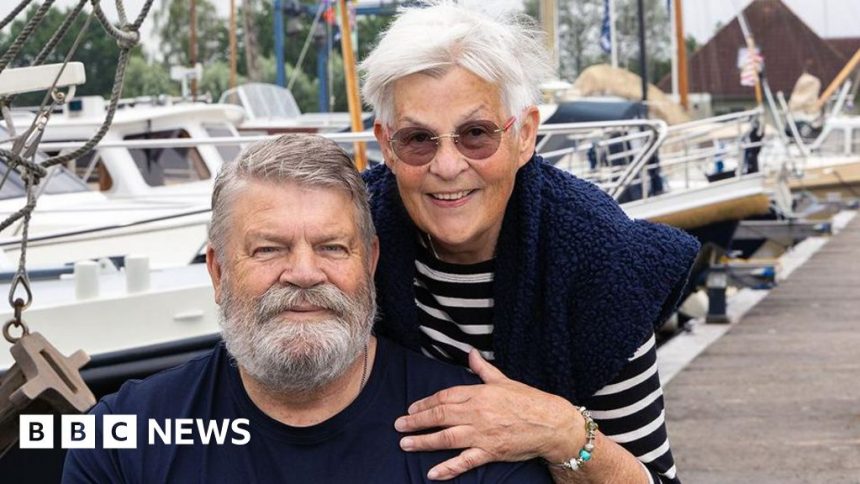Dying together: Why a happily married couple decided to stop living
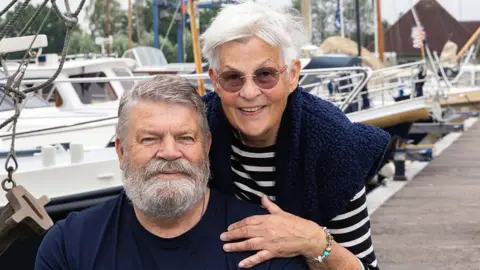 BBC
BBCJan and Els were married for almost five decades. In early June, they died together after being given lethal medication by two doctors. In the Netherlands, this is known as duo-euthanasia. It’s legal, and it’s rare – but every year, more Dutch couples choose to end their lives this way.
Some people might find this article upsetting.
Three days before they voluntarily take their last breath, Jan and Els’ campervan sits on a sunlit marina in Friesland, in the Netherlands’ north. They’re a couple who love being mobile, and have lived most of their marriage in a motorhome, or on boats.
“We tried sometimes [to live] in a pile of stones – a house,” jokes Jan, when I visit them, “but it doesn’t work.”
He’s 70, and sits in the swivel driving-seat of the van, one leg bent underneath him in the only position that eases his continuous back pain. His wife, Els, is 71 and has dementia. Now, she struggles to formulate her sentences.
“This is very good,” she says, standing up easily and pointing to her body. “But this is terrible,” she says, pointing to her head.
Jan and Els met in kindergarten – theirs was a lifelong partnership. When he was young, Jan played hockey for the Netherlands’ national youth team, and then became a sports coach. Els trained as a primary school teacher. But it was their shared love of water, boats, and sailing that defined their years together.
As a young couple they lived on a houseboat. They later bought a cargo boat and built a business transporting goods around the Netherlands’ inland waterways.
Meanwhile, Els gave birth to their only son (who asked not to be named). He became a weekly boarder at school and spent weekends with his parents. During school holidays when their child was onboard too, Jan and Els looked for work trips that would take them to interesting places – along the river Rhine, or to the Netherlands’ islands.
By 1999, the inland cargo business had become very competitive. Jan was experiencing serious back pain from the heavy-duty work he had been doing for more than a decade. He and Els moved on land, but after a few years they were again living on a boat. When that became too much to manage, they bought their spacious campervan.
Jan had surgery on his back in 2003, but it didn’t improve. He had halted a heavy regime of pain killers and could no longer work, but Els was still busy teaching. Sometimes they talked about euthanasia – Jan explained to his family he didn’t want to live too long with his physical limitations. It was around this time the couple joined NVVE – the Netherlands’ “right to die” organisation.
“If you take a lot of medicine, you live like a zombie,” Jan told me. “So, with the pain I have, and Els’ illness, I think we have to stop this.”
When Jan says “stop this”, he means – stop living.
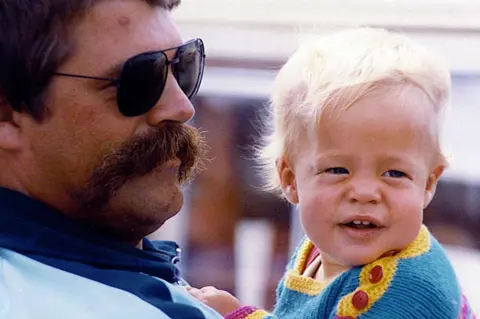
In 2018, Els retired from teaching. She was showing early signs of dementia but resisted seeing a doctor – perhaps because she had witnessed the decline and death of her father with Alzheimer’s. But there came a point when her symptoms couldn’t be ignored.
In November 2022, after being diagnosed with dementia, Els stormed out of the doctor’s consulting room, leaving her husband and son behind.
“She was furious – like a steaming bull,” remembers Jan.
It was after Els learned her condition wouldn’t improve that she and Jan, with their son, began to discuss duo-euthanasia – the two of them dying together.
In the Netherlands, euthanasia and assisted suicide are legal if someone makes a voluntary request, and their suffering – physical or psychological – is assessed by doctors as “unbearable”, with no prospect of improvement. Every person who requests assisted dying is assessed by two doctors – the second checking the evaluation made by the first.
Where to get help
In 2023, 9,068 people died by euthanasia in the Netherlands – around 5% of the total number of deaths. There were 33 instances of duo-euthanasia, so 66 people. These are complex cases made even more so if one of the partners has dementia, where there can be uncertainty about their capacity to give consent.
“A lot of doctors don’t even want to think about performing euthanasia on a patient with dementia,” says Dr Rosemarijn van Bruchem, a geriatrician and ethicist at the Erasmus Medical Centre, in Rotterdam.
This was the position of Jan and Els’ GP. And that reluctance among doctors is reflected in the euthanasia figures. Of the thousands who died in 2023, 336 had dementia. So how do medics assess the legal requirement for “unbearable suffering” in patients with dementia?
For many with early stage dementia, it’s uncertainty about how things might progress that can lead them to think about ending their life, explains Dr van Bruchem.
“Am I going to not be able to do the things I find important? Am I going to not recognise my family anymore? If you can express that well enough, if it is perceivable for both the doctor that is willing to perform euthanasia, as well as the [second] doctor that is specialised in mental competency, the existential fear of what is to come can be the reason to consider euthanasia.”
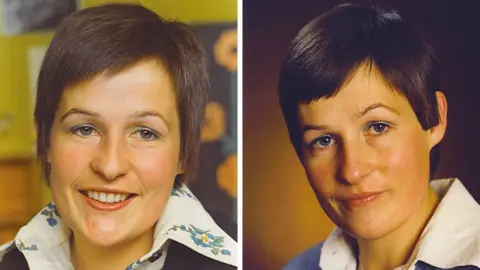 Els van Leeningen
Els van LeeningenWith their GP unwilling to engage, Jan and Els approached a mobile euthanasia clinic – the Centre of Expertise on Euthanasia. It supervised around 15% of assisted deaths last year in the Netherlands, and, on average, grants about a third of the requests it receives.
In the case of a couple wishing to end their lives together, medics must be certain one partner isn’t influencing the other.
Dr Bert Keizer has attended two duo euthanasia cases. But he also recalls meeting another couple, when he suspected the man was coercing his wife. On a further visit, Dr Keizer talked to the woman alone.
“She said she had so many plans…!” Dr Keizer says, explaining that the woman clearly realised her husband was gravely ill, but had no plans to die with him.
The euthanasia process was halted and the man died from natural causes. His wife is still alive.
Dr Theo Boer, professor of healthcare ethics at the Protestant Theological University, is one of the Netherlands’ few outspoken critics of euthanasia, and believes progress in palliative care often mitigates the need for its use.
“I would say that killing by a doctor could be justified. However, that needs to be an exception.”
What worries Dr Boer is the impact of duo-euthanasia cases – especially after one of the Netherlands’ former prime ministers and his wife chose to die together earlier this year, and made global headlines.
“In the past year we’ve seen dozens of cases of duo-euthanasia, and there’s a general tendency to ‘hero-ify’ dying together,” says Dr Boer. “But the taboo on intentional killing – that’s eroding, and especially when it comes to duo-euthanasia.”
Jan and Els could probably go on living indefinitely in their campervan. Do they feel they might be dying too soon?
“No, no, no – I cannot see it,” says Els.
“I’ve lived my life, I don’t want pain anymore,” says her husband. “The life we’ve lived, we’re getting old [for it]. We think it has to be stopped.”
And there’s something else. Els has been assessed by doctors who say she still has the capacity to decide for herself that she wants to die – but this could change if her dementia becomes more advanced.
None of this has been easy for Jan and Els’ son.
“You don’t want to let your parents die,” explains Jan. “So there have been tears – our son said, ‘Better times will come, better weather’ – but not for me.”
Els feels the same.
“There is no other solution.”
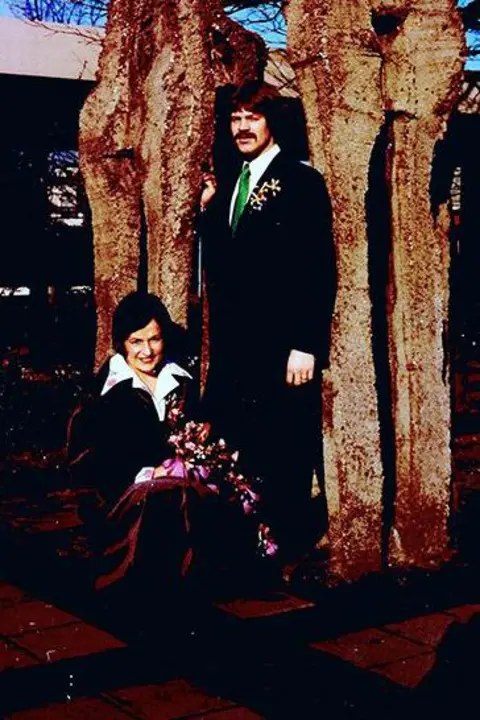
The day before their appointment with the euthanasia doctors, Els, Jan, their son and grandchildren were together. Ever practical, Jan wanted to explain the idiosyncrasies of the campervan, so it would be ready to sell.
“Then I went for a walk on the beach with my mum,” their son says. “The kids were playing, there were some jokes… It was a very strange day.
“I remember we were having dinner in the evening, and I got tears in my eyes just watching us all having that final dinner together.”
On Monday morning, everyone gathered at the local hospice. The couple’s best friends were there, brothers of both Jan and Els, and their daughter-in-law with their son.
“We had two hours together, before the doctors came,” he says. “We spoke about our memories… And we listened to music.”
Idlewild by Travis for Els, the Beatles’ Now and Then for Jan.
“The final half hour was difficult,” their son says. “The doctors arrived and everything happened quickly – they follow their routine, and then it’s just a matter of minutes.”
Els van Leeningen and Jan Faber were administered lethal medication by doctors and died together on Mon 3 Jun 2024.
Their campervan still hasn’t been put up for sale. Els and Jan’s son has decided to keep it for a bit, and go on holiday with his wife and children.
“I’ll sell it in the end,” he says. “First I want to make some memories for the family.”

Listen to Linda Pressly’s documentary Loving, Living and Dying Together on Assignment from Tue 2 Jul on BBC World Service. Or catch up later on BBC Sounds.




